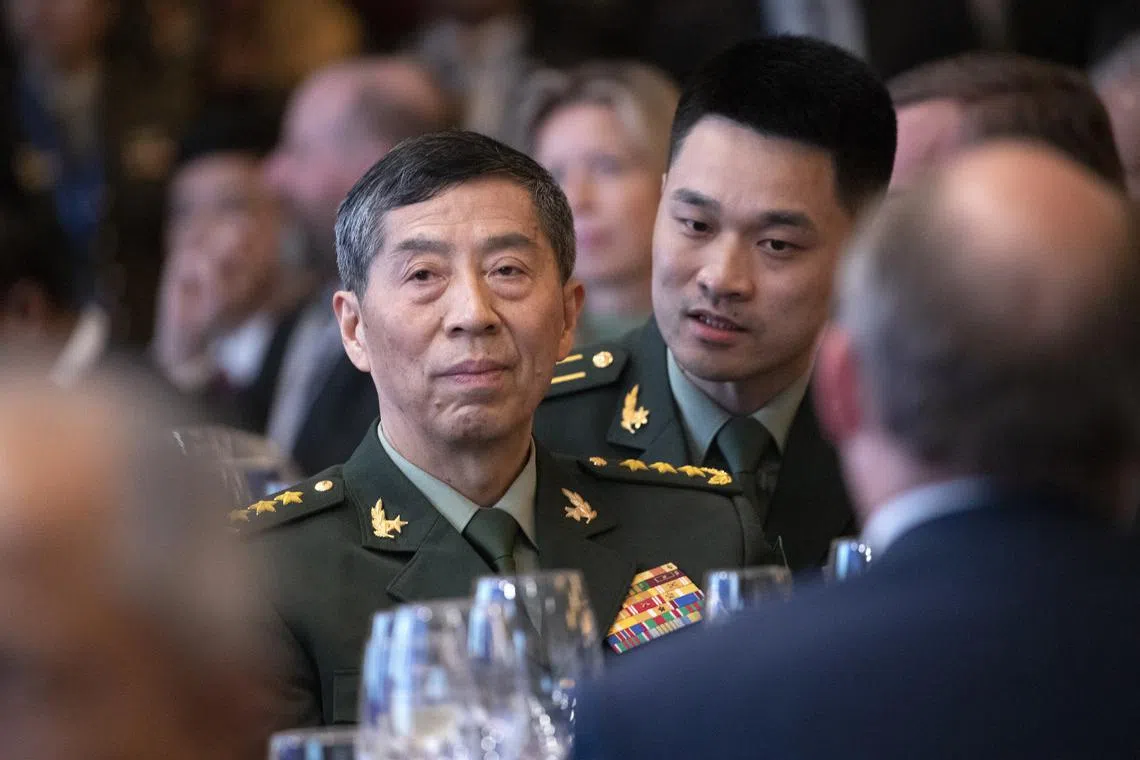Shangri-La Dialogue
The right time to talk? When sanctions are removed, says China, blaming the US for stalemate
Sign up now: Get ST's newsletters delivered to your inbox

Chinese Defence Minister Li Shangfu at the opening of the International Institute for Strategic Studies Shangri-la Dialogue on June 2, 2023.
PHOTO: EPA-EFE
SINGAPORE - The right time to talk is when the United States removes sanctions against China’s Defence Minister Li Shangfu and creates “the necessary atmosphere and conditions” for dialogue, senior Chinese officials and defence analysts said on Saturday, responding to the US’ call for a meeting as soon as possible.
China believes in the importance of developing military relations with the US, but the latter is entirely to blame for the current stalemate, said Lieutenant-General Jing Jianfeng, deputy chief of staff of the Joint Staff Department at the Central Military Commission, which oversees the People’s Liberation Army.
Earlier in the morning, US Secretary of Defence Lloyd Austin lobbed the ball into the Chinese court, saying that for “responsible defence leaders, the right time to talk is any time”,
But China swiftly hit back. In a media briefing arranged shortly after Mr Austin’s speech on the second day of the Shangri-La Dialogue, Lt-Gen Jing instead accused the US of “deceiving and exploiting” countries in the region, as well as undermining their security in its bid to maintain supremacy.
China, on the other hand, is committed to helping these nations succeed, he added.
The two major powers have had practically no interaction at this year’s forum – except for a handshake and brief greetings rejected Washington’s invitation to talks,
Instead, both sides took to speaking separately to different audiences: Gen Li was – as expected – not present at Mr Austin’s plenary speech in the morning; three hours later, Lt-Gen Jing addressed a small group of the media in a meeting room.
Gen Li will also deliver a plenary speech on Sunday morning, by which time Mr Austin will have checked out of the forum.
In his media briefing, Lt-Gen Jing systematically rebutted points in the American defence chief’s speech one by one.
The US was making use of countries in the region to pursue its hegemonic interests, he said, after Mr Austin outlined his country’s bilateral and multilateral security commitments in the Asia-Pacific.
He also accused the US of undermining regional peace and stability with its military exercises in the region, something Mr Austin had highlighted as part of an effort to help the region “deter aggression”.
Lt-Gen Jing also defended Chinese drills in the Taiwan Strait, which have intensified in recent years, saying they were aimed at deterring the self-ruled island from declaring independence. This, after Mr Austin rejected “coercion” in his speech.
Lt-Gen Jing said: “The US uses Taiwan to contain China, and the Taiwan independence separatist forces solicit US support for independence. These are the factors changing the status quo, escalating tensions.”
The US has also meddled in the South China Sea territorial disputes, he said, maintaining that China has indisputable sovereignty over the waters. The US defence chief had pledged to uphold freedom of navigation there, citing a 2016 ruling by an international tribunal in The Hague as legally binding.
The tribunal had rejected Beijing’s claim and ruled that the eastern part of the disputed waters, which Filipinos call the West Philippine Sea, belongs to the Philippines.
While many of his points are a restatement of China’s position, the vigorous response to Mr Austin’s speech effectively shuts the door on any slim hopes for some kind of dialogue at the forum, which concludes on Sunday after lunch.
Mr Austin had similarly not minced words, accusing China of continuing to make “an alarming number of risky intercepts” of US aircraft, such as one over the South China Sea recently, and pledging to support US allies and partners to “defend themselves against coercion and bullying”.
But still, he said, “dialogue is not a reward; it is a necessity”, in an implicit response to earlier calls by Beijing for the sanctions to be removed as a precondition for talks to take place.
But retired People’s Liberation Army senior colonel Zhou Bo told The Sunday Times that it is inconceivable for Gen Li to meet Mr Austin when the sanctions are still in place, questioning how the US can ask to speak to someone it is penalising.
The US’ refusal to lift sanctions is hugely consequential, added the senior fellow at the Centre for International Security and Strategy at Tsinghua University.
“Just think, in the next five years – the Chinese defence minister’s term is for five years – there are no meetings. Can they bear it?” he said, referring to the US.
The Chinese delegates also say that going beyond the issue of sanctions, any meeting will have to be conducted on an equal footing that takes into account the interests of both parties.
Lieutenant-General He Lei, who is part of the official Chinese delegation, told reporters shortly after the speech: “The US is constantly challenging China’s bottom line and undermining China’s core interests. In this environment, the conditions are not ripe for the US and Chinese defence ministers to meet at the 20th Shangri-La Dialogue.”
The two countries’ defence chiefs met briefly on Friday night at the summit’s opening dinner, where they shook hands and sat at the same table.
As it is, the handshake was a “reflection of the inclusiveness and flexibility of Chinese diplomacy and Chinese military diplomacy”, said Lt-Gen He, a former deputy director of the People’s Liberation Army’s Academy of Military Science.


